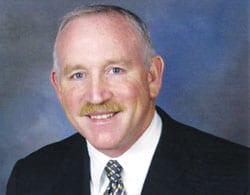 Dr. Brady Allen has spent 33 years treating HIV patients and researching the virus.
Dr. Brady Allen has spent 33 years treating HIV patients and researching the virus.
When he first started practicing medicine, there was no such thing as an “HIV doctor.” But after his residency, Allen returned to Dallas, in 1981, to work as an internist. He later branched out to start his own practice and first treated HIV patients in late 1983.
With the disease just coming onto the scene, Allen says he got thrown into the specialty as an internist and as an openly gay man.
“A lot of sick gay men were around, and being an internist in a big city I just started seeing HIV break onto the scene,” he says.
So Allen did what any good doctor would do when faced with a deadly new disease: he researched, talked to the community about prevention as news developed and he helped his patients with pain as they awaited death. He’s now an HIV expert who’s first-hand experience had led to several research articles on HIV-related infections and even a book chapter.
“I was in the right place at the right time and sort of became an HIV expert by learning and by doing,” Allen says. “Initially my role was to be a leader in the community and an educator.”
But with the early stages of HIV/AIDS came the witness of the beginning of the control of the disease in 1995 when triple combination therapy became available, and people started getting better and living.
“From 1982 to 1995 was a period of despair and lot of horrible death and dying so I became very skilled at pain control and helping patients die with dignity,” Allen recalls.
Allen has served on the boards of various HIV/AIDS organizations, many of which have given him awards, including the Crystal Hope Award from AIDS Interfaith Network, the Aetna Award from DIFFA, the Volunteer of the Year award from the AIDS Arms Network, and a joint Lifetime Achievement Award from all the AIDS agencies in Dallas in 2007 to mark his 25 years in the field.
Even with all of his accomplishments, Allen, now 61 and working at Uptown Physicians, which he founded, plans to work for many more years, at least five before he considers retiring. After all he’s seen in HIV care and treatment, it’d be hard to walk away from his life’s work.
“My whole career has been HIV related and I’ve seen dramatic turnaround from complete death and dying to a chronic manageable illness,” he says.
THE CATHEDRAL OF HOPE
1971
THE DALLAS TAVERN GUILD
1977
This article appeared in the Dallas Voice print edition May 16, 2014.

